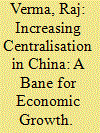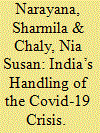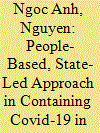|
|
|
Sort Order |
|
|
|
Items / Page
|
|
|
|
|
|
|
| Srl | Item |
| 1 |
ID:
188685


|
|
|
|
|
| Summary/Abstract |
At independence in 1991, Kyrgyzstan inherited the former Soviet Union's distinct 'semi-presidential' system combining a robust president, a weak parliament, and a meek prime minister. Its governance then was categorized as a 'president-parliamentary' system under Shugart and Carey's typology. However, Kyrgyzstan's 2010 'April Revolution' paved the way for a new 'premier-presidential' system intended to elevate the status of the prime minister and parliament and thereby diffuse power among rival political elites. This 'premier-presidential' system turned out to be a short-lived experiment: the 2020 'October Uprising' resulted in a turn to a system of 'strong presidentialism'. This study aims to present an analysis of the fissures in the 'premier-presidential' system of 2010-2020 which eventually contributed to its downfall. It argues that the downfall of the premier-presidential system was primarily caused by two sets of factors, structural and contingent, working in tandem.
|
|
|
|
|
|
|
|
|
|
|
|
|
|
|
|
| 2 |
ID:
188686


|
|
|
|
|
| Summary/Abstract |
This essay is written as an overview of Sikandar Hayat's (1946-) longtime scholarship on the creation of Pakistan with Mohammad Ali Jinnah (1876-1948) as the focal leader. It seeks to bring out the main argument and analyses of Hayat's books on the subject. The main thrust of the essay, consistent with an exposition of Hayat's works, is that the creation of Pakistan was a complex process and that both Jinnah's critics, who often deny him agency, and his uncritical admirers, who exaggerate it out of all proportion, seem to miss the larger historical context and lessons to be derived from Jinnah's life and times. Hayat employs an analytical approach that, among other things, articulates a framework for understanding charismatic leadership in non-Eurocentric environments, restores valid agency to Jinnah, and never loses sight of the context and larger historical forces he, and the All-India Muslim League, had to contend with. As Pakistan marks 75 years of its independent existence, debates and discourses about its creation continue, and Hayat's contributions to that discourse need to be examined and understood outside his own country
|
|
|
|
|
|
|
|
|
|
|
|
|
|
|
|
| 3 |
ID:
188679


|
|
|
|
|
| Summary/Abstract |
This article contends that increasing centralisation of decision-making in China will undermine the country’s future economic growth. It highlights the declining role of private enterprises and the increasing role of state-owned enterprises (SOEs) in the economy, and the extension of Communist Party influence in both SOEs and the private sector through the Party’s Organization Department and United Front Work Department. It argues that the increasing role of the state in the economy over the past decade has stifled growth through a decline in ‘total factor productivity’ because of increasing misallocation of resources. Centralisation, with associated losses in efficiency, objectivity, agility, speed and finesse regarding allocations of risks and investment, has debilitated decentralised decision-making and reduced the incentives for undertaking risks and innovation. The article argues that increasing Party control over the SOEs and the private sector will negatively impact the corporate structure and management decisions, exacerbate the fundamental problems of corporate governance and limit or hamper innovation.
|
|
|
|
|
|
|
|
|
|
|
|
|
|
|
|
| 4 |
ID:
188684


|
|
|
|
|
| Summary/Abstract |
Covid-19 exposed the fragility and inadequacies in India’s health care system, especially in its public health services. The sudden lockdown imposed during the first wave of the virus severely impacted the livelihoods of millions of migrant workers. Then, in spite of warnings about an impending second wave of infection, the government’s failure to prepare the health infrastructure, together with delays in vaccine distribution, cost the lives of hundreds of thousands of people. Unlike the first wave of infection, the second wave impacted rural India very badly. Taking into consideration the existing social hierarchies and inequalities, it was marginalised groups of the population who bore the brunt of the pandemic. This article analyses the failures of the Indian government in handling the Covid-19 crisis, especially during the second wave, and concludes by suggesting ways in which the state needs to intervene to avert disasters of this kind in the future. It argues for the adoption of a ‘rights-based’ approach to public health on the grounds that successive governments have not been properly held to account for their long-term failures to address the issue.
|
|
|
|
|
|
|
|
|
|
|
|
|
|
|
|
| 5 |
ID:
188678


|
|
|
|
|
| Summary/Abstract |
I am very pleased to welcome you to this issue of Asian Affairs, the first that I have overseen since being appointed editor in June. I am very honoured to be taking over from Bijan Omrani, who oversaw a major expansion in the Journal’s reach and impact during his time in the editor’s chair from late 2014 until the middle of this year. Bijan will not be completely walking away, however, since he remains a trustee of the Journal’s “parent”, the Royal Society for Asian Affairs.
|
|
|
|
|
|
|
|
|
|
|
|
|
|
|
|
| 6 |
ID:
188683


|
|
|
|
|
| Summary/Abstract |
Vietnam's efforts to contain the Covid-19 pandemic have been widely praised. The country's leadership took early action to close its borders and reduce community transmission and kept case numbers low, at least in the first year. Between 23 January 2020, when the first cases were detected in Vietnam, and 25 March 2021, the end of the third wave of infection, the country experienced just 2,830 cases and 35 deaths. However, the fourth wave, from 27 April 2021 to 30 March 2022 (when the Vietnamese government declared a formal end to the pandemic), saw over ten million confirmed cases, and 42,454 recorded fatalities. This article examines why the first three waves were successfully contained and the fourth wave of COVID was so much more damaging.
|
|
|
|
|
|
|
|
|
|
|
|
|
|
|
|
|
|
|
|
|